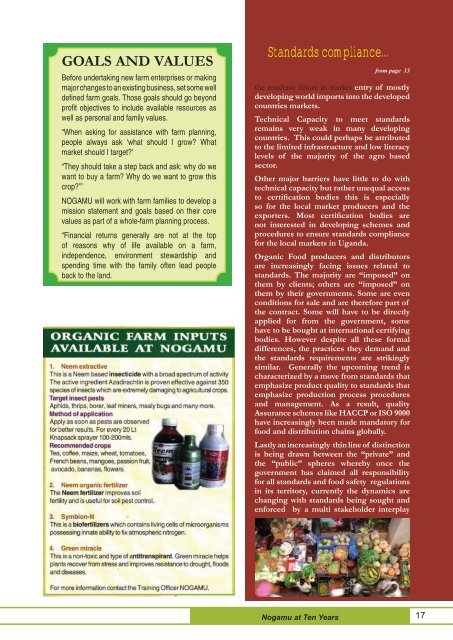Newsletter issue 33 - Nogamu
Newsletter issue 33 - Nogamu
Newsletter issue 33 - Nogamu
You also want an ePaper? Increase the reach of your titles
YUMPU automatically turns print PDFs into web optimized ePapers that Google loves.
GOALS AND VALUES<br />
Before undertaking new farm enterprises or making<br />
major changes to an existing business, set some well<br />
defined farm goals. Those goals should go beyond<br />
profit objectives to include available resources as<br />
well as personal and family values.<br />
“When asking for assistance with farm planning,<br />
people always ask ‘what should I grow? What<br />
market should I target?’<br />
“They should take a step back and ask: why do we<br />
want to buy a farm? Why do we want to grow this<br />
crop?’”<br />
NOGAMU will work with farm families to develop a<br />
mission statement and goals based on their core<br />
values as part of a whole-farm planning process.<br />
“Financial returns generally are not at the top<br />
of reasons why of life available on a farm,<br />
independence, environment stewardship and<br />
spending time with the family often lead people<br />
back to the land.<br />
Standards compliance...<br />
from page 13<br />
the resultant failure in market entry of mostly<br />
developing world imports into the developed<br />
countries markets.<br />
Technical Capacity to meet standards<br />
remains very weak in many developing<br />
countries. This could perhaps be attributed<br />
to the limited infrastructure and low literacy<br />
levels of the majority of the agro based<br />
sector.<br />
Other major barriers have little to do with<br />
technical capacity but rather unequal access<br />
to certification bodies this is especially<br />
so for the local market producers and the<br />
exporters. Most certification bodies are<br />
not interested in developing schemes and<br />
procedures to ensure standards compliance<br />
for the local markets in Uganda.<br />
Organic Food producers and distributors<br />
are increasingly facing <strong>issue</strong>s related to<br />
standards. The majority are “imposed” on<br />
them by clients; others are “imposed” on<br />
them by their governments. Some are even<br />
conditions for sale and are therefore part of<br />
the contract. Some will have to be directly<br />
applied for from the government, some<br />
have to be bought at international certifying<br />
bodies. However despite all these formal<br />
differences, the practices they demand and<br />
the standards requirements are strikingly<br />
similar. Generally the upcoming trend is<br />
characterized by a move from standards that<br />
emphasize product quality to standards that<br />
emphasize production process procedures<br />
and management. As a result, quality<br />
Assurance schemes like HACCP or ISO 9000<br />
have increasingly been made mandatory for<br />
food and distribution chains globally.<br />
Lastly an increasingly thin line of distinction<br />
is being drawn between the “private” and<br />
the “public” spheres whereby once the<br />
government has claimed all responsibility<br />
for all standards and food safety regulations<br />
in its territory, currently the dynamics are<br />
changing with standards being sought and<br />
enforced by a multi stakeholder interplay<br />
<strong>Nogamu</strong> at Ten Years<br />
17


